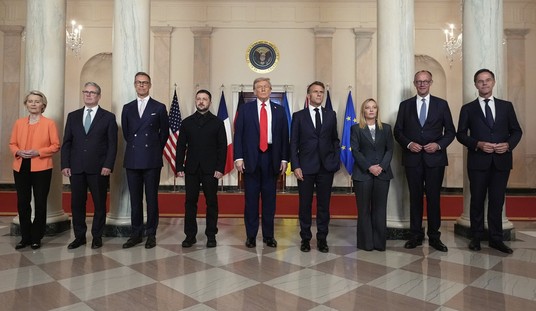Does a full week off for federal workers to volunteer for election duty sound like a wise idea? How about federal subsidies for political campaigns that set up “matching” funds for donors? A new paid federal holiday on Election Day turns out to be the most benign part of HR1, the election-reform package designated by Nancy Pelosi as the new House majority’s “signature” legislation in this session. Mitch McConnell ripped the bill on the Senate floor yesterday, calling it a “power grab” that would best be named the “Democratic Politician Protection Act.”
Don’t hold back, Senator … tell us how you really feel:
Do you look forward to the bumper stickers, robocalls, attack ads, and campaign mail that descend on the country in seemingly-endless cycles? Speaker Pelosi must think you do, because she wants to you pay for these things with your tax dollars. This bill creates brand-new government subsidies both for political campaign donors and for the campaigns themselves. The federal government would start ‘matching’ political donations the same way some employers match gifts to charity. You would literally be funding attack ads for the candidates you disagree with! …
But they aren’t stopping there. Democrats also want taxpayers on the hook for generous new benefits for federal bureaucrats and government employees. Their bill would make Election Day a new paid holiday for government workers and create an additional, brand-new paid leave benefit of up to six days for any federal bureaucrat who decides they’d like to hang out at the polls during any election.
So this is the Democrats’ plan to ‘restore democracy.’ A brand-new week of paid vacation for every federal employee who’d like to hover around while you cast your ballot. A Washington-based, taxpayer-subsidized clearinghouse for political campaign funding. A political power grab that’s smelling more and more like what it is.
Pelosi should send McConnell a bouquet of flowers for spending this much time on the Senate floor on a bill that has zero chance of becoming law. For a “signature” bill, which is what the HR1 designation signifies, the coverage of this bill has been remarkably low-key. Two progressive outlets, Common Dreams and The Nation, both endorsed it and ripped Republicans in advance for their opposition. MSNBC’s Steve Benen called it an opportunity for a “worthwhile debate” and noted that the committee hearing over it had been “lively”:
For Capitol Hill watchers, the spirited argument over one of the most fundamental issues undergirding our political system was encouraging, even if many of the far-right arguments and observations were absurd. It led a colleague of mine to ask a good question.
“I was wondering why I feel like it’s been a while since I’ve seen or heard about actual contentious hearings on proposed legislation,” Isaac-Davy Aronson asked, adding, “Is it true that it’s been a while since we’ve had a real hearing like this?” …
Yesterday’s hearing on HR1 was, at varying times, contentious, exasperating, and encouraging. But just as importantly, it was an example of how the legislative process is supposed to work – and how it didn’t work when the GOP majority ran the chamber.
The Washington Post covered the bill through the prism of McConnell’s criticisms, which their report largely corroborated:
The far-reaching legislation would also prohibit the purging of voter rolls, require presidential and vice-presidential candidates to release their tax returns, compel states to adopt independent redistricting commissions and create a matching system for small-dollar donations to congressional campaigns, among other changes.
In his Wednesday remarks, as well as in a Washington Post op-ed earlier this month, McConnell mocked the legislation as the “Democrat Politician Protection Act.”
“H.R. 1 would victimize every American taxpayer by pouring their money into expensive new subsidies that don’t even pass the laugh test,” McConnell said on the Senate floor.
The matching-fund subsidies are perhaps the most laughable part of this package, although the six days of leave for federal workers to volunteer for political work might be the most offensive. (Gee, I wonder who will benefit from all that volunteer labor from SEIU/AFSCME members?) The US had a matching-funds program for presidential elections that worked pretty well for a few decades, until Barack Obama refused to use it and comply with spending and fundraising restrictions in 2008. He claimed that the system was broken and that he’d fix it once he took office, but Democrats never lifted a finger to do so in the two years that they had full control of the federal government. Suddenly Pelosi’s interested in creating a similar system for House and Senate races? Pardon us if we’re less than impressed with the Democrats’ track record on such matters.
At any rate, this is all academic. Pelosi knows this won’t move in the Senate; it’s a setup for the 2020 congressional elections. However, it’s not exactly the kind of bill that will fire up voters or be remembered for very long after its demise. House Democrats might have been better advised to focus more on hardening the voting infrastructure in the country ahead of the next election, a project that would have a much greater chance of success than giving federal workers freebies for participating in Democratic campaigns.







Join the conversation as a VIP Member